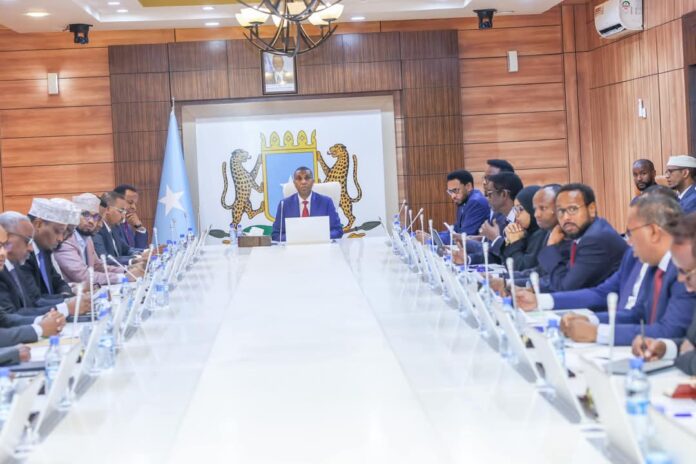MOGADISHU, Somalia — Prime Minister Hamza Abdi Barre on Thursday presided over a significant cabinet session in Mogadishu, focusing on the nation’s ongoing development and security strategies.
The meeting included detailed presentations on the progress of the National Transformation Plan, recent security operations, and the rollout of the Value Added Tax (VAT) system which was launched at the beginning of the year.
The session began with a comprehensive review of the National Transformation Plan, which aims to restructure and reform various sectors of the Somali government and economy. Key areas of discussion included infrastructure development, educational reforms, and health services improvement.
Security was another focal point, with the Ministry of Internal Security briefing the cabinet on the strategic movements of the Somali National Army (SNA). The government has started deploying SNA units to Raskamboni, a town in the Lower Juba region under Jubaland State.
This deployment is part of a broader plan to gradually take over security responsibilities from the African Union Transition Mission in Somalia (ATMIS), signaling a step toward national self-sufficiency in security matters.
The meeting also addressed the implications and effectiveness of the newly implemented VAT. The tax system, aimed at broadening the government’s revenue base, has been met with mixed reactions from the business community.
The finance minister highlighted efforts to improve tax collection mechanisms and compliance, while also addressing concerns about potential economic impacts on small businesses and the general populace.
The discussions underscored the government’s commitment to transparency and accountability, with Prime Minister Barre emphasizing the need for continued dialogue with stakeholders to refine policy implementations.
The cabinet meeting, which included ministers, senior government officials, and advisors, concluded with plans for follow-up assessments to monitor the progress of each initiative discussed. The next weekly council meeting is expected to delve deeper into the feedback received on these policies and strategic deployments.





